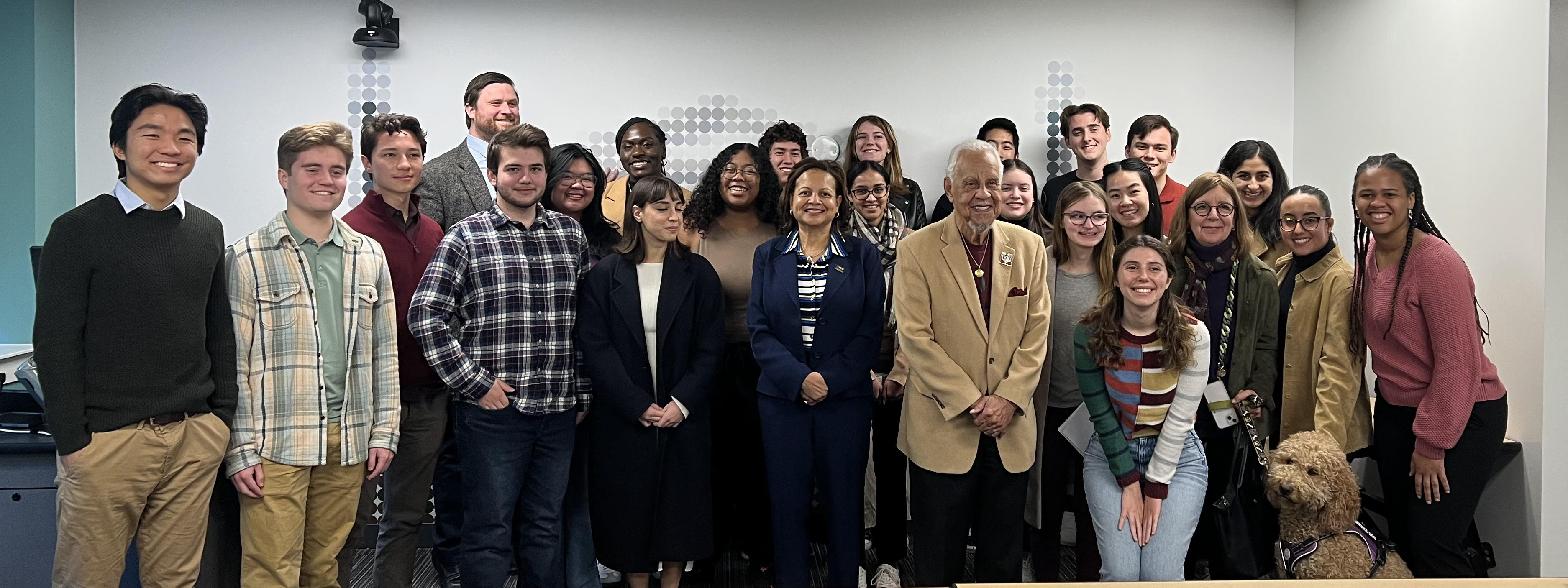News
Governor L. Douglas Wilder hosts Stanford University students for a key discussion on running successful elections

by David Slipher
A delegation of more than 25 Stanford University students and their professor joined the Wilder School as part of a special session of their course, “Inside Modern Campaigns: How Elections are Won and Lost”
During the gathering, Governor Wilder shared his expansive experiences about the state of leadership, both local and national, as well as his perspectives and observations of the changes and challenges facing good governance. He discussed his gubernatorial campaign, where he traveled across the state, building relationships and identifying the needs of the people through grassroots democracy. During his 60-day tour of the commonwealth, the governor visited many rural areas, refusing to stay at hotels but rather quartering at the homes of citizens.
“I never had one incident in which anybody ever refused the entrance to their establishments, barbershop, who all recognized the campaign. I never had a single instance when anyone refused to shake my hand or talk to me or to grant me the opportunity (to speak with them).”
Professor James Hohmann, a lecturer at Stanford, historian and Washington Post editorial writer, specializing in domestic policy and politics, introduced the Governor to his class. Hohmann outlined in the course syllabus that “politics is as much art as science. We will pull back the curtain on how the nature of campaigns, along with media coverage of American politics, is changing.”
The objectives of the course are to build students' critical thinking about how campaign strategies are devised and implemented. Hohmann encourages his students to “go outside your comfort zone. Put aside any personal political feelings to understand the mechanics of electioneering.”
“You guys got a lot of work to do, a whole lot of work to do. And you can make yourselves felt wherever you are.”
– Governor L. Douglas Wilder
Governor Wilder — despite becoming the first elected African-American governor in the U.S. — shared that he didn’t run his campaign by identifying as a Black American. A decorated Korean War veteran, he revealed that he was elected through a commitment to transcend racial and socioeconomic lines as a holistic representative of all peoples. His platform recognized that the people’s needs and experiences are always ahead of the politicians.
“That doesn't mean you’ve got to run for office,” he said. “Criticize what is wrong. Make certain those that represent you are doing it or else vote them out without apology. Get rid of them without apology.”
Susan Gooden, dean of the Wilder School, speaking to the group, reflected on the historic moment of Wilder’s election as governor. “I remember that vividly because I wasn't much older than you all,” she said. “I was a student at Virginia Tech when that election occurred. And as you're building up to that election, the momentum, the engagement, people were watching this election, literally across the world." She added that to this day, "every time I speak with the governor and hear him talk, I learn something that I didn't know.”
As governor, Wilder is remembered for his significant contributions to the commonwealth, including and establishing a rainy day fund to respond to and support emergencies, crises and unforeseen circumstances. He was lauded by Financial World magazine for two consecutive years for leading the best-managed state in the U.S. An inherited deficit, though tightening budget and spending, was transmuted into a surplus. He also fought to establish Martin Luther King Jr. Day as a recognized state holiday, the first state in the nation to do so.
Through his elections as a Virginia state senator, lieutenant governor, and eventually mayor of Richmond, he developed successful campaigns that solidified his status as a tested leader.
Governor Wilder fielded questions from the undergraduate students, exploring a range of topics, from his historic campaign strategies to the continued need to stand for people through critiquing current issues critical to Virginians, as well as the upcoming election. He shared that most concerns of citizens are perennial and that effecting change is essential as a leader. Governor Wilder highlighted the significance of democracy in action and charged the students to make impacts in their communities.
“You guys got a lot of work to do, a whole lot of work to do. And you can make yourselves felt wherever you are.”
-770x513.jpg)